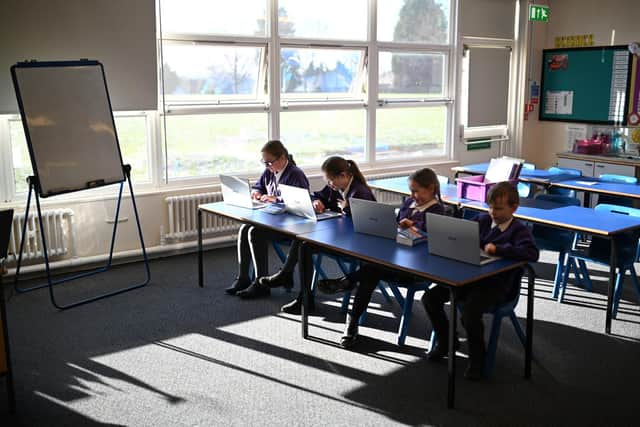ChatGPT is just one reason why Scotland must keep exams – Cameron Wyllie
The essay wasn’t great, but it was competent: it could have been a solid foundation for a piece of N5 English coursework, bland but highly literate: “Ultimately, the degree to which we are sympathetic to Blanche Dubois is likely to depend on our own individual experiences, beliefs and values.” Thank you, Chat. So just like every other literary character then?
It was with this in mind I approached the interim report of a review led by Professor Louise Hayward into educational assessment and qualifications in Scotland. Commendably, we were all encouraged to participate in the review. Having previously expressed concern about the rather loaded questions, this report appears measured and sensible; if these recommendations are eventually accepted, which will involve a considerable change in mindset and practice across Scotland’s schools, I think there will be a positive impact on education.
Advertisement
Hide AdAdvertisement
Hide AdThat said, a wry smile did cross my ageing face as I read the three central recommendations, because none of them is exactly new. The first is the proposal to introduce a Scottish diploma of achievement, which would present a record of a young person’s success in school across a “broad range of areas”. This would, in effect, join up a number of things: exam results, yes, but also work in the community, sports, creative arts, participation in all sorts of areas, many of them – like, say the Duke of Edinburgh’s Award Scheme – currently separately certificated.
This is a nod in the direction of the “four capacities” around which the Curriculum for Excellence is based, and is a reasonable admission that, of these four desirable outcomes (successful learner, effective contributor, confident individual and responsible citizen), only the first is really examined and certificated at the moment. Well, us oldies might say that creating ‘successful learners’ is far and away the most important function of a school, but I essentially applaud the idea that all the excellent things our young people do should be recognised and recorded in the one place. There was, mind you, much discussion of the same concept in 1992, when the ill-fated Howie Committee suggested a not dissimilar revamping of certification. I liked it then, and I like it now.
The second central recommendation is that young people should only do a formal exam at the level from which they will exit the subject, ie if you’re going to do Higher maths, you don’t do Nat 5 – presumably there will be a system in place to give you some kind of award if you then fail. I completely agree with this proposal and well I might, because it’s exactly the system I went through myself when I did my Highers in the 70s.
In S5, I did a wider range of Highers because I didn’t do these subjects for what was then O Grade. In effect, this meant that I started doing Higher courses in S4 (or even S3) because I didn’t need to complete O Grade courses. It was called ‘bypassing’, and it had two advantages: firstly, it meant that young people didn’t face the rigmarole and stress of doing exams over and over again; secondly, it was great for high achievers, who could do more subjects at a Higher level without footering about for two years doing easier content.
In my view, this would go some way in reversing the ‘dumbing down’ which is an inevitable outcome of the way in which Curriculum for Excellence is structured, which actually restricts choice at Higher in S5 by insisting on a third year of "broad general education” in S3 – incidentally, a structure which no independent school in the country uses.


The third recommendation, as very much expected, is that there should be more of “a balance between internal and external assessment” (meaning Scottish Qualification Authority exams and other external exams). This is fine up to a point, providing of course, there is enough scrutiny as to the quality and security of internal assessments. However, I do think that external exams should remain the primary means of assessing young people’s abilities in the senior years – as they have been for decades – and I think that for two reasons.
The first, as outlined above, is that a swing towards internal assessment, as a starting point, must work out the implications of new-fangled and dangerous student aids like ChatGPT but the second, and more important, is that exams are fair. Yes, wealthy parents can buy in tutors to help their kids (very often with coursework); yes, some young people will inevitably have been taught better in individual subject areas; yes, some students will have home environments more conducive to learning, including the advantages accruing to having parents who themselves encourage your studies and are able to help when you’re stuck (not always an unmixed blessing). But at least everyone sitting Higher maths sits the same paper at the same time on the same day.
It seems to me that the SQA exams, so long a benchmark, a ‘gold standard’ in Scottish education, can’t just be dispensed with – apart from anything else I await the higher education lobby’s response to the review. In essence, though, I hope the monolith of Scottish education, for years so static and inflexible, stuck between academic educationalists, government and the unions, and in danger of crushing the life out of Scotland’s brave but weary teachers, will be listening to Professor Hayward, and I look forward to the full report.
Cameron Wyllie writes a blog called A House in Joppa; his book, Is There a Pigeon in the Room? My Life in Schools, is published by Birlinn
Comments
Want to join the conversation? Please or to comment on this article.